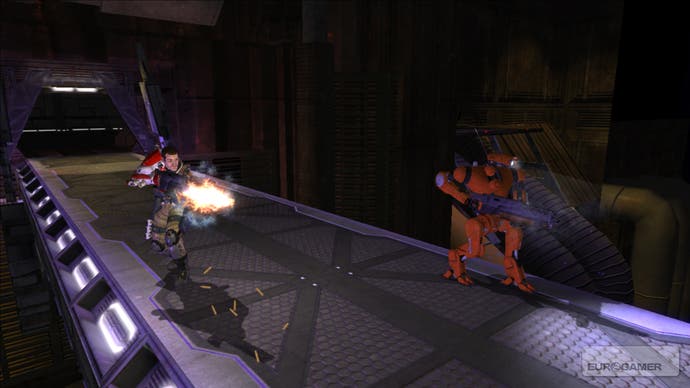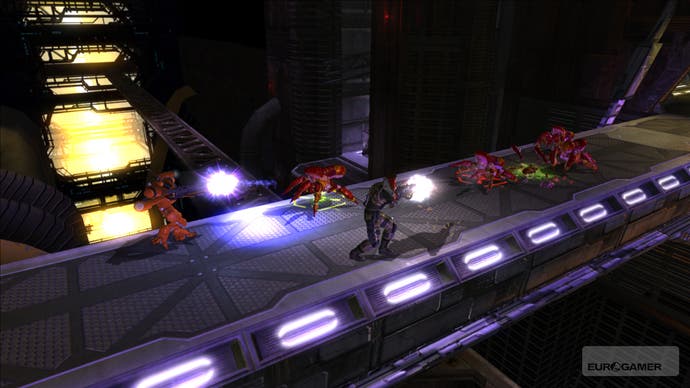Space Siege
Taking the crawler out of the dungeon.
Under Siege, but no Segal
Other aspects of the action RPG genre fall by the wayside like confetti as Taylor explains Space Siege to us. The game eschews the concept of experience points in favour of the aforementioned cybernetic upgrades; Taylor dismisses the experience system as "old school".
In fact, he dismisses a lot of things as being old school; the original design, he says, called for many different types of parts to be pieced together to make cybernetic upgrades. This, too, was "old school", and the team decided that people don't want that level of detail to stand between them and the fun combat sections. Instead, the game now sports one generic resource, "parts".
Game Over screens, too, are "old school". Instead, the game will sport regular health stations scattered throughout the levels, and when you die, you respawn at the last station you visited. Sound familiar? Taylor makes no bones about the similarity with Bioshock's Vita Chambers - a lot of Gas Powered's decisions, he says, were confirmed by Bioshock's popularity.
Space Siege looks great, with all the bells and whistles you'd expect from a high-budget modern game - but it's hard to escape the fact that there's something innately weird about listening to the man who made Supreme Commander lay into the old school, hardcore conventions of videogames.

Indeed, there's a feeling that Taylor has had something of a Road to Damascus experience - and Space Siege is the result. He's open and honest about his belief that the hardcore market for games is diminishing, and believes that what consumers want now is a fun "interactive entertainment" experience, rather than a traditional "videogame".
It should no longer be an exercise in seeing how far into a game you can get before giving up in frustration, he argues; you should get to the end of the game, and enjoy the satisfaction and the closure of the ending. Developers, he says bluntly, have always underestimated the value to the consumer of actually finishing games.
Part of Taylor's new approach, then, is putting more action into the action RPG. Players in Space Siege can mix and match tactics from traditional RPGs and tactics more familiar to players of action games - grenades bounce using real physics, which also applies to objects in the world, and enemies can be knocked off ledges and walkways with well-aimed attacks. Systems like clever enemy AI, fully 3D environments (which are huge vertically as well as horizontally) and realistic physics are being imported en masse from the FPS genre into Space Siege.
Tales of the Unexpected

Another part, though, is to do with storytelling - and if there's a single dramatic U-turn in Taylor's conversion, this is it. Whereas with Dungeon Siege, he was happy to let a dull, hackneyed storyline underlie the action, believing that it was unimportant compared to the game mechanics, Space Siege places huge importance on the story.
"The writing has to be great, the voice acting has to be great," he says with passion. He wants players to care about the back-story, about the motivations of the characters. The result could be spectacular; here, after all, is a man celebrated for his finely tuned game design, so we can't imagine Space Siege's combat being overlooked or unloved as a result of his newfound joy in storytelling. The idea that both aspects will be equally great is very compelling.
Returning briefly to the gritty details, Space Siege will boast a single-player campaign running for 15 to 20 hours, with multiplayer modes also included in the mix. Taylor expects that there'll be significant replayability in there, because of the humanity score; most players will finish it once by upgrading their character as much as possible, and many will go back to try and do it without losing Walker's humanity in the process.
Right now, the game is destined for the PC alone - although, as you'd expect for a man professing to have such a strong focus on the "mainstream" gamer, Taylor doesn't rule out console versions, saying that that's simply a decision for the publisher to make.
Space Siege is due out sometime next Spring, according to Gas Powered's rough estimate. We're looking forward to taking a closer look in the coming months.





.png?width=291&height=164&fit=crop&quality=80&format=jpg&auto=webp)



